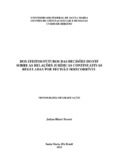| dc.contributor.advisor | Zampieri, Marcelo Carlos | |
| dc.creator | Farret, Julian Ritzel | |
| dc.date.accessioned | 2017-05-18T00:01:17Z | |
| dc.date.available | 2017-05-18T00:01:17Z | |
| dc.date.issued | 2012-12-17 | |
| dc.date.submitted | 2012 | |
| dc.identifier.uri | http://repositorio.ufsm.br/handle/1/2875 | |
| dc.description | Trabalho de conclusão de curso (graduação) - Universidade Federal de Santa Maria, Centro de Ciências Sociais e Humanas, Curso de Direito, RS, 2012 | por |
| dc.description.abstract | This work takes care of the possible future effects that the Supremo Tribunal Federal’s
decisions may cause over the continuative relations regulated by a final judgment. Once
proposed the subject, we found that the res judicata’s objective limits keeps close relation
with the category of legal relationship deduced in court. Therefore, we sought for a technical
definition of the continuative relations mentioned in the article 471, I, CPC. In a second step,
once defined these relations as successive relations, ie immediate relationships periodically
repeated, we tried to find the objective and temporal limits of the res judicata which wraps the
decision that regulates this sort of legal relation. Then we tried to identify which legal
phenomenon might represent a change in the state of law mentioned in the article 471, I, CPC.
We detected, thus, that the change in the state of law must essentially represent a change in
the legal order itself. Changes in the state of law, hence, are nothing less than the legislative
change and the supervene of some of the decisions of the Supremo Tribunal Federal,
depending on the form of constitutionality control. Finally, the conclusion of this work is that
the supervening decision of the Supremo Tribunal Federal, depending on the sort of
constitutionality control in which the decision is taken, has the power to change the legal
order and, therefore, stop the res judicata’s prospective effects. | eng |
| dc.language | por | por |
| dc.publisher | Universidade Federal de Santa Maria | por |
| dc.rights | Acesso Aberto | por |
| dc.subject | Relações jurídicas continuativas | por |
| dc.subject | Efeitos prospectivos da coisa julgada | por |
| dc.subject | Controle de constitucionalidade | por |
| dc.subject | Alteração do ordenamento jurídico | por |
| dc.subject | Modificação no estado de direito | por |
| dc.subject | Continuative legal relations | eng |
| dc.subject | Prospective effects of res judicata | eng |
| dc.subject | Judicial review | eng |
| dc.subject | Change in the legal order | eng |
| dc.subject | Change in the state of law | eng |
| dc.title | Dos efeitos futuros das decisões do STF sobre as relações jurídicas continuativas reguladas por decisão irrecorrível | por |
| dc.title.alternative | The prospective effects of the STF's decision over continuative relations regulated in a final judgment | eng |
| dc.type | Trabalho de Conclusão de Curso de Graduação | por |
| dc.degree.local | Santa Maria, RS, Brasil | por |
| dc.degree.graduation | Curso de Direito | por |
| dc.description.resumo | O presente trabalho cuida dos possíveis efeitos futuros que as decisões do Supremo Tribunal
Federal podem causar às relações jurídicas continuativas reguladas por sentença transitada em
julgado. Uma vez proposto o tema, expusemos que os limites objetivos da coisa julgada guardam
íntima relação com a espécie de relação jurídica deduzida em juízo. Por isso, buscamos
na doutrina uma definição técnica das relações jurídicas continuativas de que trata o art. 471,
I, do CPC. Em um segundo momento, definidas estas relações como relações jurídicas sucessivas,
ou seja, relações jurídicas instantâneas que se repetem, conferimos quais são os limites
objetivos e temporais da coisa julgada que recai sobre a sentença que regula esta espécie de
relação. Buscamos, nesse sentido, identificar que espécie de fenômeno jurídico pode significar
uma modificação no estado de direito das relações jurídicas continuativas. Constatamos,
deste modo, que a alteração no estado de direito da relação jurídica deve representar, na verdade,
uma modificação no próprio ordenamento jurídico. Assim, os fenômenos aptos a modificar
o estado de direito da relação são nada menos do que a própria alteração legislativa e a
superveniência de algumas das decisões do Supremo Tribunal Federal, a depender da modalidade
de controle de constitucionalidade em que foram proferidas. Desta forma, a conclusão
deste trabalho é que a superveniência de decisão do Supremo Tribunal Federal, a depender da
modalidade de controle de constitucionalidade a que está submetida, tem o condão de alterar o
ordenamento jurídico e, por isso, estancar os efeitos prospectivos que irradiam da coisa julgada. | por |
| dc.publisher.unidade | Centro de Ciências Sociais e Humanas | por |


